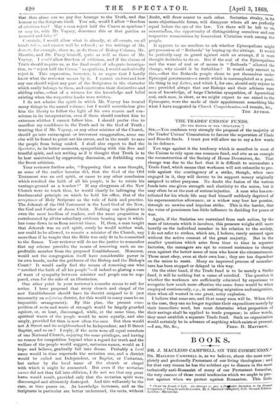THE TRADES' UNIONS' FUNDS.
[TO THE EDITOR 01, THE " SPECTATOR.") SIR,—You condemn very strongly the proposal of the majority of the Trades' Unions' Commission to favour the separation of Trade and Benefit funds. I trust you will allow me to say a few words in its defence.
You urge against it the tendency which is manifest in most of the Unions to rely upon one common fund, and cite as an example the reconstruction of the Society of House Decorators, &c. That change was due to the fact that it is difficult to accumulate a Trade fund, which means that workmen will not subscribe to provide against the contingency of a strike, though, when once engaged in it, they will devote to its support money originally assigned to other purposes. No doubt the fusion of the various funds into one gives strength and elasticity to the union, but it may often be at the cost of serious injustice. A man who has contributed for his whole life may find himself suddenly deprived of his superannuation allowance, or a widow may lose her pension, through an unwise and hopeless strike. This is the harder, that the voice of pensioners has little influence in deciding for peace or War.
Again, if the Societies are restrained from rash action, by the mass of interests which it involves, this pressure weighs still more heavily on the individual member in his relation to the society, I do not refer to strikes, which are, I believe, rarely entered upon without the active consent of the great majority. But in the smaller questions which arise from time to time in separate factories, the managers are apt to counsel resistance to change even against the better sense of men who know the circumstances. These must obey, even at their own loss ; they are too dependent on the union to resist. Many an improved process of manufacture has been stopped or delayed in this way.
On the other hand, if the Trade fund is to be merely a Strike fund, it will be nothing but a cause of mischief. The question is whether the workmen are sufficiently educated by experience to recognize how much more effective the same force would be when employed continuously, e.g., in assisting migration and emigration, than when all wasted in one great, noisy explosion.
I believe that some are, and that many soon will be. When this is the case, they can no longer regulate their expenditure merely by their immediate need, but must determine what proportion of their savings shall be applied to trade purposes ; in other words, they must establish a separate Trade fund. Such an organization would certainly be in advance of anything which exists at present.
—I am, Sir, &c., FRED. D. MATTHEW.


































 Previous page
Previous page